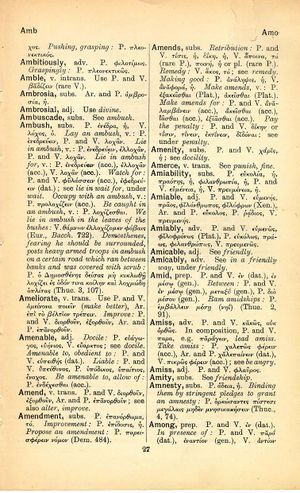amiss
From LSJ
ὥσπερ γὰρ ζώου τῶν ὄψεων ἀφαιρεθεισῶν ἀχρειοῦται τὸ ὅλον, οὕτως ἐξ ἱστορίας ἀναιρεθείσης τῆς ἀληθείας τὸ καταλειπόμενον αὐτῆς ἀνωφελὲς γίνεται διήγημα → for just as a living creature which has lost its eyesight is wholly incapacitated, so if history is stripped of her truth all that is left is but an idle tale | for, just as closed eyes make the rest of an animal useless, what is left from a history blind to the truth is just a pointless tale

